2025人教版高中英语选择性必修第一册同步练习题--UNIT 2 Part 2 Learning About Language &Using Language(含答案与解析)
文档属性
| 名称 | 2025人教版高中英语选择性必修第一册同步练习题--UNIT 2 Part 2 Learning About Language &Using Language(含答案与解析) | 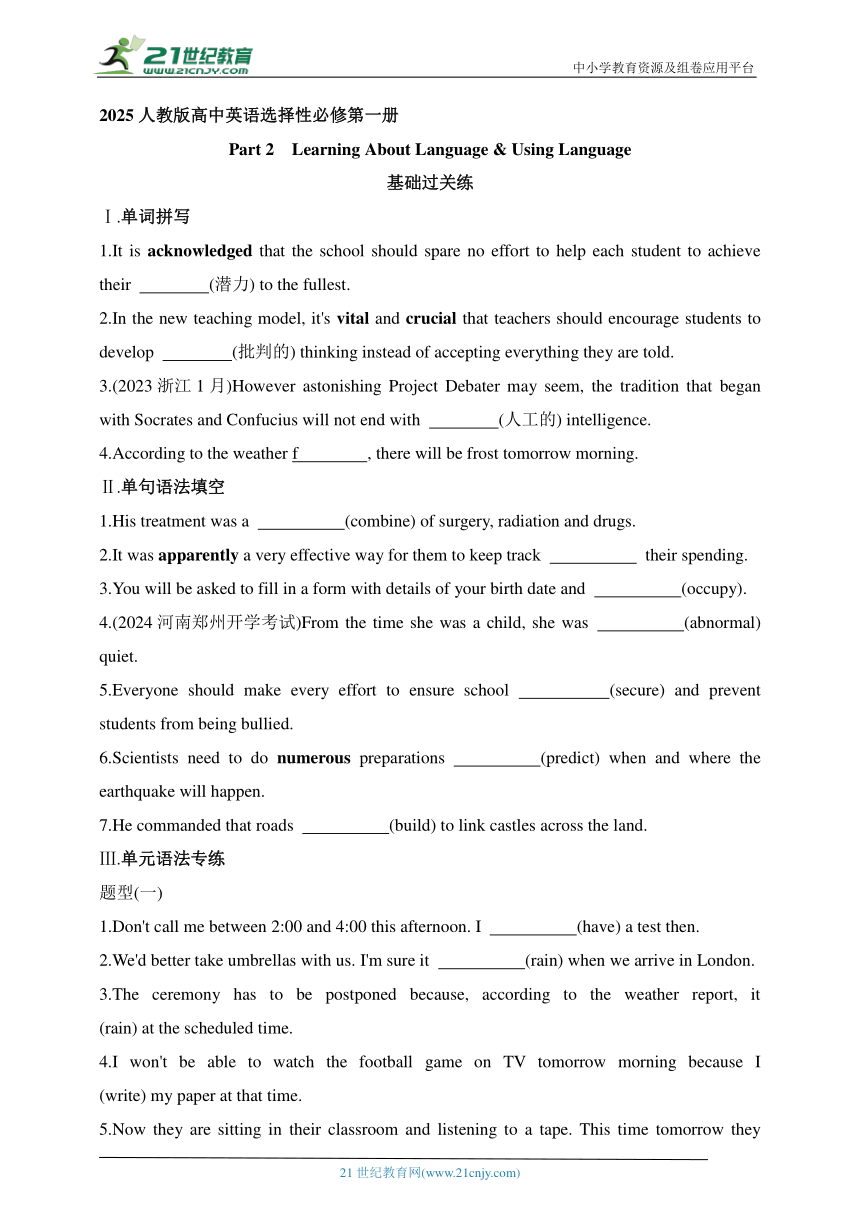 | |
| 格式 | docx | ||
| 文件大小 | 348.1KB | ||
| 资源类型 | 试卷 | ||
| 版本资源 | 人教版(2019) | ||
| 科目 | 英语 | ||
| 更新时间 | 2024-06-05 12:21:05 | ||
图片预览

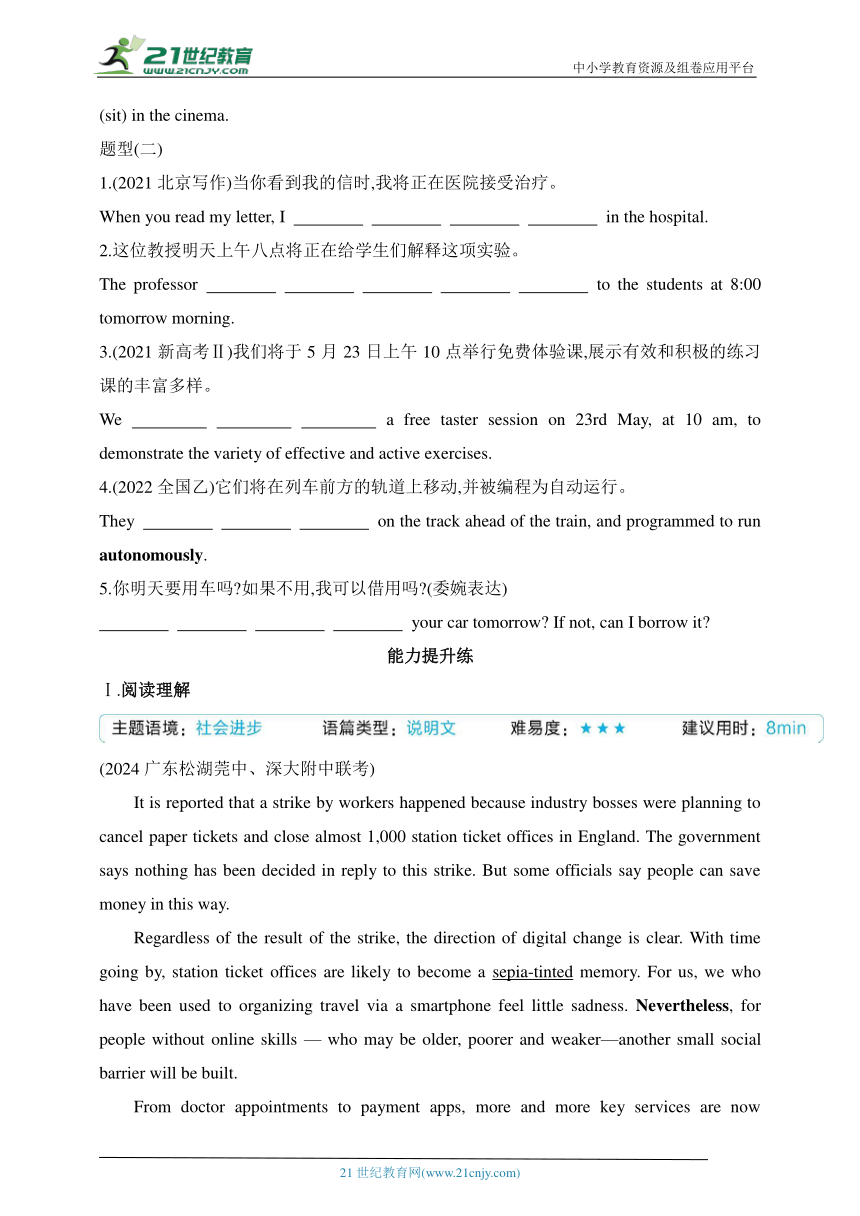
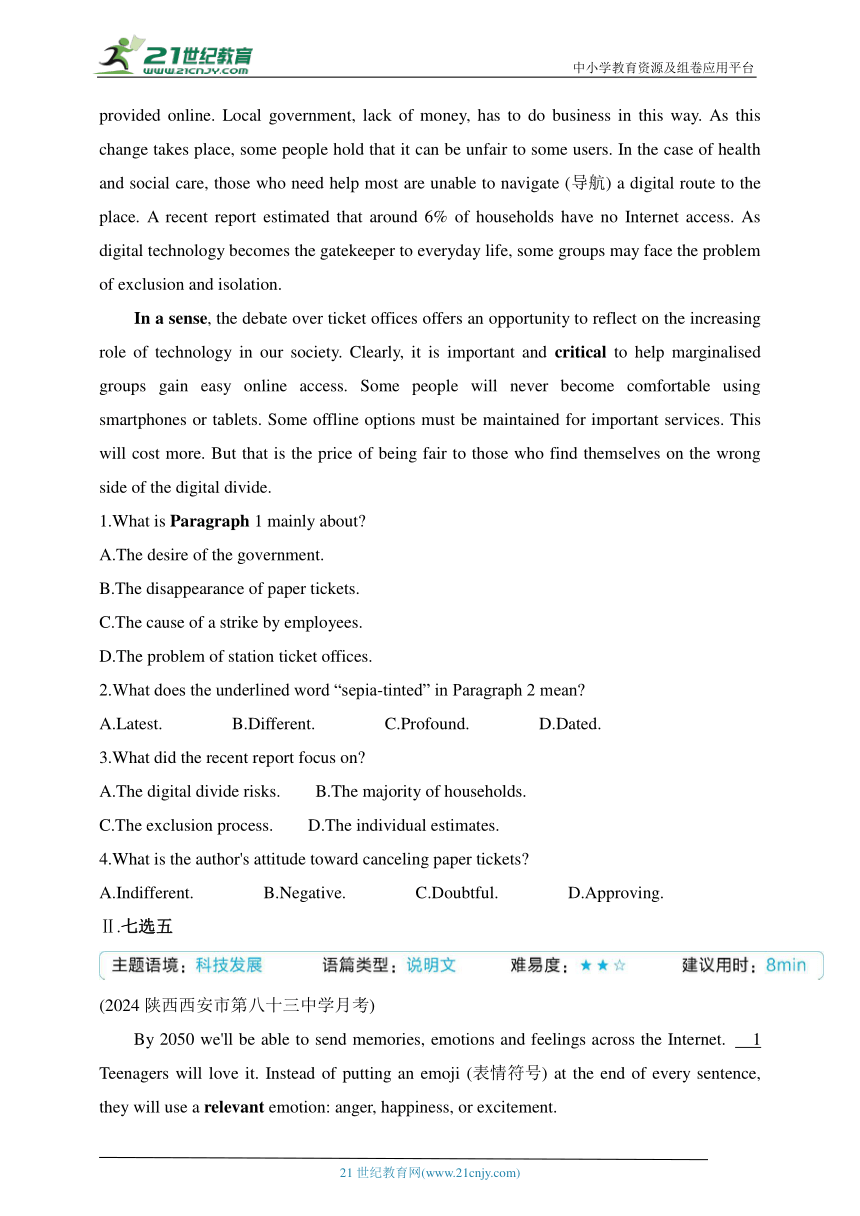
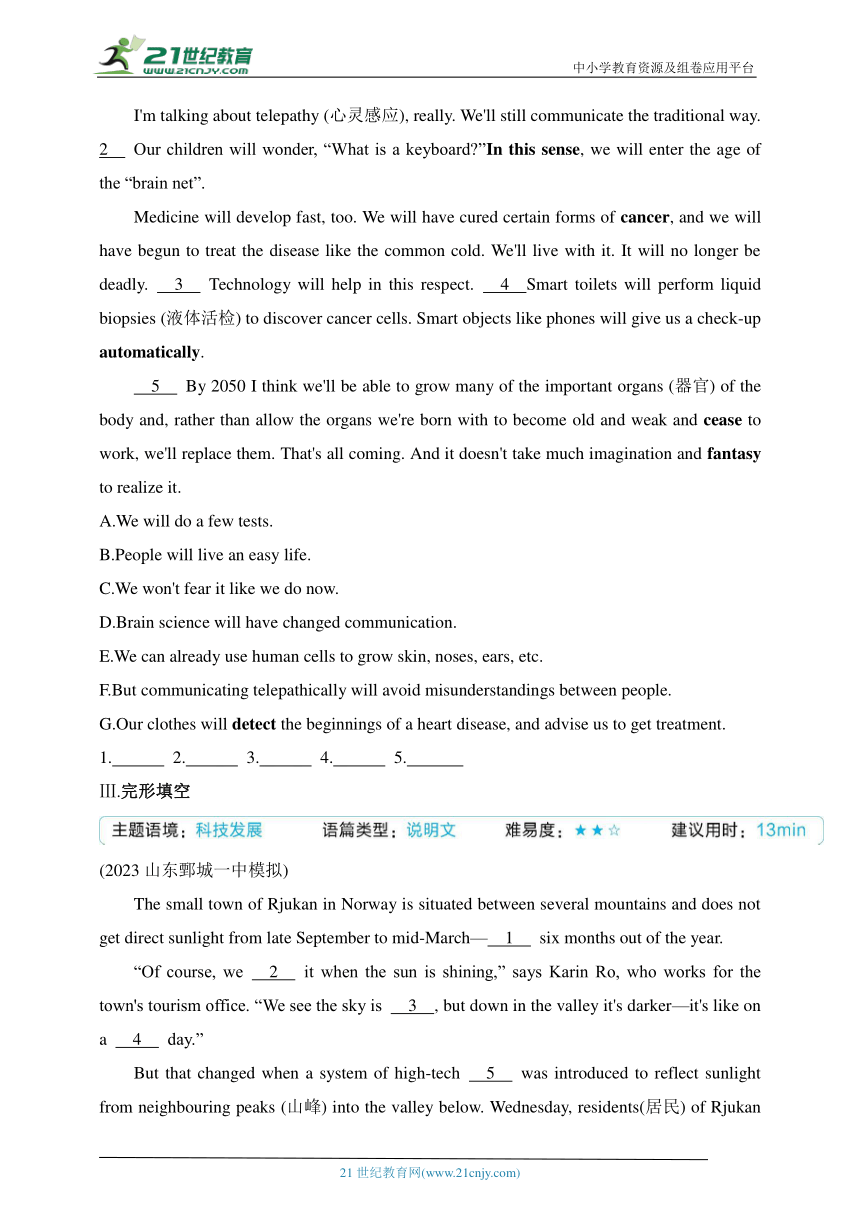
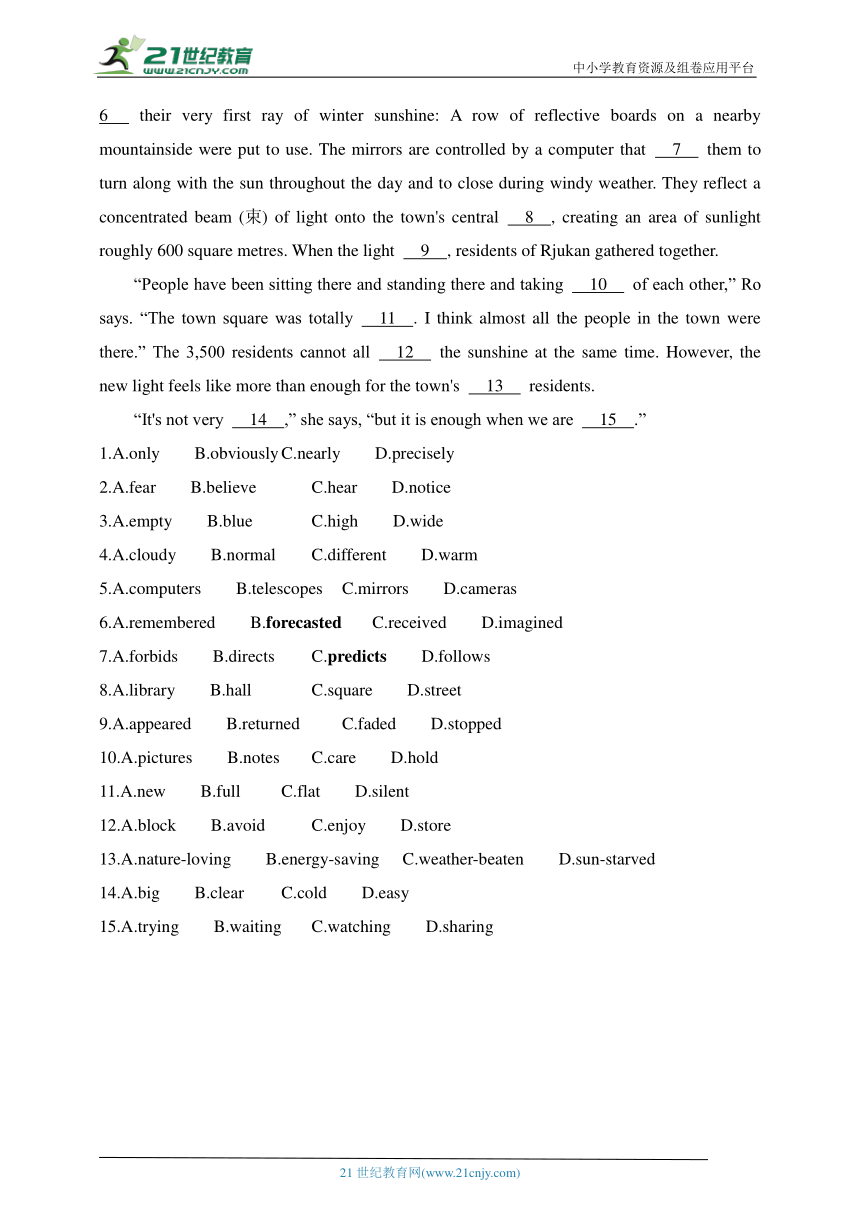
文档简介
中小学教育资源及组卷应用平台
2025人教版高中英语选择性必修第一册
Part 2 Learning About Language & Using Language
基础过关练
Ⅰ.单词拼写
1.It is acknowledged that the school should spare no effort to help each student to achieve their (潜力) to the fullest.
2.In the new teaching model, it's vital and crucial that teachers should encourage students to develop (批判的) thinking instead of accepting everything they are told.
3.(2023浙江1月)However astonishing Project Debater may seem, the tradition that began with Socrates and Confucius will not end with (人工的) intelligence.
4.According to the weather f , there will be frost tomorrow morning.
Ⅱ.单句语法填空
1.His treatment was a (combine) of surgery, radiation and drugs.
2.It was apparently a very effective way for them to keep track their spending.
3.You will be asked to fill in a form with details of your birth date and (occupy).
4.(2024河南郑州开学考试)From the time she was a child, she was (abnormal) quiet.
5.Everyone should make every effort to ensure school (secure) and prevent students from being bullied.
6.Scientists need to do numerous preparations (predict) when and where the earthquake will happen.
7.He commanded that roads (build) to link castles across the land.
Ⅲ.单元语法专练
题型(一)
1.Don't call me between 2:00 and 4:00 this afternoon. I (have) a test then.
2.We'd better take umbrellas with us. I'm sure it (rain) when we arrive in London.
3.The ceremony has to be postponed because, according to the weather report, it (rain) at the scheduled time.
4.I won't be able to watch the football game on TV tomorrow morning because I (write) my paper at that time.
5.Now they are sitting in their classroom and listening to a tape. This time tomorrow they (sit) in the cinema.
题型(二)
1.(2021北京写作)当你看到我的信时,我将正在医院接受治疗。
When you read my letter, I in the hospital.
2.这位教授明天上午八点将正在给学生们解释这项实验。
The professor to the students at 8:00 tomorrow morning.
3.(2021新高考Ⅱ)我们将于5月23日上午10点举行免费体验课,展示有效和积极的练习课的丰富多样。
We a free taster session on 23rd May, at 10 am, to demonstrate the variety of effective and active exercises.
4.(2022全国乙)它们将在列车前方的轨道上移动,并被编程为自动运行。
They on the track ahead of the train, and programmed to run autonomously.
5.你明天要用车吗 如果不用,我可以借用吗 (委婉表达)
your car tomorrow If not, can I borrow it
能力提升练
Ⅰ.阅读理解
(2024广东松湖莞中、深大附中联考)
It is reported that a strike by workers happened because industry bosses were planning to cancel paper tickets and close almost 1,000 station ticket offices in England. The government says nothing has been decided in reply to this strike. But some officials say people can save money in this way.
Regardless of the result of the strike, the direction of digital change is clear. With time going by, station ticket offices are likely to become a sepia-tinted memory. For us, we who have been used to organizing travel via a smartphone feel little sadness. Nevertheless, for people without online skills — who may be older, poorer and weaker—another small social barrier will be built.
From doctor appointments to payment apps, more and more key services are now provided online. Local government, lack of money, has to do business in this way. As this change takes place, some people hold that it can be unfair to some users. In the case of health and social care, those who need help most are unable to navigate (导航) a digital route to the place. A recent report estimated that around 6% of households have no Internet access. As digital technology becomes the gatekeeper to everyday life, some groups may face the problem of exclusion and isolation.
In a sense, the debate over ticket offices offers an opportunity to reflect on the increasing role of technology in our society. Clearly, it is important and critical to help marginalised groups gain easy online access. Some people will never become comfortable using smartphones or tablets. Some offline options must be maintained for important services. This will cost more. But that is the price of being fair to those who find themselves on the wrong side of the digital divide.
1.What is Paragraph 1 mainly about
A.The desire of the government.
B.The disappearance of paper tickets.
C.The cause of a strike by employees.
D.The problem of station ticket offices.
2.What does the underlined word “sepia-tinted” in Paragraph 2 mean
A.Latest. B.Different. C.Profound. D.Dated.
3.What did the recent report focus on
A.The digital divide risks. B.The majority of households.
C.The exclusion process. D.The individual estimates.
4.What is the author's attitude toward canceling paper tickets
A.Indifferent. B.Negative. C.Doubtful. D.Approving.
Ⅱ.七选五
(2024陕西西安市第八十三中学月考)
By 2050 we'll be able to send memories, emotions and feelings across the Internet. 1 Teenagers will love it. Instead of putting an emoji (表情符号) at the end of every sentence, they will use a relevant emotion: anger, happiness, or excitement.
I'm talking about telepathy (心灵感应), really. We'll still communicate the traditional way. 2 Our children will wonder, “What is a keyboard ”In this sense, we will enter the age of the “brain net”.
Medicine will develop fast, too. We will have cured certain forms of cancer, and we will have begun to treat the disease like the common cold. We'll live with it. It will no longer be deadly. 3 Technology will help in this respect. 4 Smart toilets will perform liquid biopsies (液体活检) to discover cancer cells. Smart objects like phones will give us a check-up automatically.
5 By 2050 I think we'll be able to grow many of the important organs (器官) of the body and, rather than allow the organs we're born with to become old and weak and cease to work, we'll replace them. That's all coming. And it doesn't take much imagination and fantasy to realize it.
A.We will do a few tests.
B.People will live an easy life.
C.We won't fear it like we do now.
D.Brain science will have changed communication.
E.We can already use human cells to grow skin, noses, ears, etc.
F.But communicating telepathically will avoid misunderstandings between people.
G.Our clothes will detect the beginnings of a heart disease, and advise us to get treatment.
1. 2. 3. 4. 5.
Ⅲ.完形填空
(2023山东鄄城一中模拟)
The small town of Rjukan in Norway is situated between several mountains and does not get direct sunlight from late September to mid-March— 1 six months out of the year.
“Of course, we 2 it when the sun is shining,” says Karin Ro, who works for the town's tourism office. “We see the sky is 3 , but down in the valley it's darker—it's like on a 4 day.”
But that changed when a system of high-tech 5 was introduced to reflect sunlight from neighbouring peaks (山峰) into the valley below. Wednesday, residents(居民) of Rjukan 6 their very first ray of winter sunshine: A row of reflective boards on a nearby mountainside were put to use. The mirrors are controlled by a computer that 7 them to turn along with the sun throughout the day and to close during windy weather. They reflect a concentrated beam (束) of light onto the town's central 8 , creating an area of sunlight roughly 600 square metres. When the light 9 , residents of Rjukan gathered together.
“People have been sitting there and standing there and taking 10 of each other,” Ro says. “The town square was totally 11 . I think almost all the people in the town were there.” The 3,500 residents cannot all 12 the sunshine at the same time. However, the new light feels like more than enough for the town's 13 residents.
“It's not very 14 ,” she says, “but it is enough when we are 15 .”
1.A.only B.obviously C.nearly D.precisely
2.A.fear B.believe C.hear D.notice
3.A.empty B.blue C.high D.wide
4.A.cloudy B.normal C.different D.warm
5.A.computers B.telescopes C.mirrors D.cameras
6.A.remembered B.forecasted C.received D.imagined
7.A.forbids B.directs C.predicts D.follows
8.A.library B.hall C.square D.street
9.A.appeared B.returned C.faded D.stopped
10.A.pictures B.notes C.care D.hold
11.A.new B.full C.flat D.silent
12.A.block B.avoid C.enjoy D.store
13.A.nature-loving B.energy-saving C.weather-beaten D.sun-starved
14.A.big B.clear C.cold D.easy
15.A.trying B.waiting C.watching D.sharing
答案与分层梯度式解析
Part 2 Learning About Language &Using Language
基础过关练
Ⅰ.1.potential 2.critical 3.artificial 4.forecast
Ⅱ.1.combination 考查名词。根据空前的a和空后的of可知此处应用名词,故填combination。句意:对他的治疗是把手术、放射疗法和药物治疗结合为一体。
2.of 考查介词。keep track of意为“了解……的动态”。故填of。句意:对他们来说,这显然是了解他们的开销的一种非常有效的方法。
3.occupation 考查名词。设空处和and前的birth date为并列成分,由此可知此处应用名词单数形式。故填occupation。句意:你会被要求填写一张有关你的出生日期和职业详情的表格。
4.abnormally 考查副词。设空处修饰其后的形容词quiet,故填副词abnormally。句意:从小她就出奇地安静。
5.security 考查名词。分析句子结构可知设空处应用名词作动词ensure的宾语,secure的名词形式是security。句意:每个人都应该不遗余力地保证校园安全,阻止学生受到霸凌的危害。
6.to predict 考查动词不定式。句意:为了预测地震将会在何时何地发生,科学家们需要做很多准备工作。结合句意可知,此处应用动词不定式作目的状语。故填to predict。
7.be built 考查虚拟语气。句意:他下令修建连接各地城堡的道路。command意为“命令”时,其后的宾语从句要用虚拟语气,即从句谓语用“should+动词原形”的形式,其中should可以省略。从句主语roads和build之间是被动关系,应用被动语态。故填be built。
Ⅲ.题型(一)
1.will be having 考查将来进行时。句意:今天下午2点到4点之间不要给我打电话。那个时候我将正在考试。由时间状语then并结合句意可知,此处应用将来进行时。
2.will be raining 考查将来进行时。句意:我们最好随身带上雨伞。我确信当我们到达时,伦敦将正在下雨。根据when we arrive in London并结合句意可知,此处应用将来进行时。
3.will be raining 考查将来进行时。句意:典礼不得不推迟,因为根据天气预报,预定时间将正在下雨。根据时间状语at the scheduled time并结合句意可知此处表示将来某一个时间点正在进行的动作,应用将来进行时。
4.will be writing 考查将来进行时。句意:我明天早上将不能在电视上看足球赛了,因为那时我将正在写论文。由时间状语tomorrow morning及at that time并结合句意可知,此处应用将来进行时。
5.will be sitting 考查将来进行时。句意:现在他们正坐在教室里听录音带。明天的这个时候他们将正坐在电影院。 由时间状语This time tomorrow并结合句意可知,此处应用将来进行时。
题型(二)
1.will be being treated 2.will be explaining the experiment
3.will be holding 4.will be moving 5.Will you be using
能力提升练
Ⅰ.◎语篇解读 本文是一篇说明文。文章主要讲述了铁路行业想要把车票的销售转移到线上,这种数字化转型引起了一些问题。
1.C 主旨大意题。文章第一段主要提到,行业大佬计划取消纸质车票,并关闭英国的近1,000个车站售票处,由此引发了罢工。政府表示没有做出决定以回应这次罢工。由此可知,第一段主要介绍了罢工的原因。故选C。
2.D 词义猜测题。画线词前面谈到,数字化转型的方向是明确的。画线词所在句意为“随着时间的推移,车站售票处很可能变成一个……记忆”。画线词后谈到我们这些习惯了通过智能手机来组织旅行的人几乎不会感到悲伤。由此可知,画线词sepia-tinted与D项“dated陈旧的,过时的”意思相近。故选D。
3.A 推理判断题。文章第三段最后两句提到“最近的一份报告估计,约6%的家庭无法上网。随着数字技术成为日常生活的门槛,一些群体可能会面临着被排斥和孤立的问题”。所以,最近的这份报告关注了数字鸿沟带来的风险。故选A。
4.B 推理判断题。文章最后一段谈到,一些人永远不会自如地使用智能手机或平板电脑,必须保留一些重要服务的线下选择,虽然花费会多一些,但那就是实现公平的代价。由此推知,作者对于取消纸质车票的态度是消极的。故选B。
【高频词汇】 1.cancel v.取消 2.in reply to答复
3.regardless of不管…… 4.barrier n.障碍
5.appointment n.预约;约定 6.take place 发生
7.estimate v.估计 8.access n.(使用或见到的)机会,权利 9.option n.选择;选择权 10.maintain v.保持;维修
【熟词生义】 1.strike n.罢工 2.hold v.认为 3.divide n.界限;差异,分歧
【差距词汇】 1.exclusion n.排斥;排除 2.isolation n.隔离;孤独 3.reflect on认真思考
长难句
原句 It is reported that a strike by workers happened because industry bosses were planning to cancel paper tickets and close almost 1,000 station ticket offices in England.
分析 该句是一个主从复合句。It作形式主语,that引导主语从句;because引导原因状语从句。
译文 据报道,工人因为行业大佬计划取消纸质车票,并关闭英国的近1,000个车站售票处而进行了罢工。
Ⅱ.◎语篇解读 本文为一篇说明文。作者从三个方面畅想了未来的生活。
1.D 细节句。 设空处前提到,到2050年,我们将能够通过互联网传递记忆、情感和感觉。设空处后提到,青少年会很喜欢这样。他们不再在每句话的末尾加上表情符号,而是将直接使用相关的感情:生气、开心或者激动。由此可知,本段在讲未来交流的方式的变化,分析选项,D项“脑科学将已经改变了交流。”符合本段主旨,故选D。
2.F 细节句。本段首句提到了心灵感应。设空处前一句提到,我们仍然会用传统的方式交流,F项“但是以心灵感应的方式交流能避免人与人之间产生误会。”与前一句构成转折关系,且呼应首句提到的心灵感应,符合语境。故选F。
3.C 细节句。 前文讲到,医疗也会快速发展,我们将能治愈某些癌症,并且我们会开始像对待普通感冒一样对待癌症,我们会和它共存,它将不再是致命的。C项“我们不会像现在这样害怕它。”承接上文,符合语境。故选C。
4.G 细节句。设空处前提到科技将在这方面有所帮助。设空处后举了智能马桶能通过液体活检来发现癌细胞的例子。G项“我们的衣服会发现心脏病的先兆,并建议我们去治疗。”也是在日常生活中,科技在医疗方面应用的具体例子,符合语境。故选G。
5.E 细节句。根据设空处后面内容“到2050年,我认为我们将能够培育很多重要的人体器官,而不再是任由我们生来就有的器官变老变虚弱,停止工作,我们可以替换它们。”可知,本段与器官有关,E项“我们已经可以用人体细胞来培育皮肤、鼻子、耳朵,等等。”也是在讲器官,符合语境。故选E。
【高频词汇】 1.instead of代替 2.cure v.治愈 3.treat v.对待;治疗;款待 4.deadly adj.致命的 5.perform v.实施;执行;表演 6.rather than而不是 7.replace v.替换;代替;取代
【熟词生义】 1.respect n.方面 2.realize v.实现
长难句
原句 By 2050 I think we'll be able to grow many of the important organs of the body and, rather than allow the organs we're born with to become old and weak and cease to work, we'll replace them.
分析 该句是由连词and 连接的并列复合句。在第一个分句中think后为省略了that的宾语从句;在第二个分句中we're born with为省略了关系代词which或that的定语从句,修饰先行词organs。
译文 到2050年,我认为我们将能够培育很多重要的人体器官,而不再是任由我们生来就有的器官变老变虚弱,停止工作,我们可以替换它们。
Ⅲ.◎语篇解读 本文是一篇说明文。挪威一个叫Rjukan的小镇一年中几乎有半年的时间没有直射的太阳光。现在借助于一套高科技的镜子,生活在这个山谷的居民终于能在冬季享受太阳光了。
1.C 根据上文“from late September to mid-March”可知,此处指差不多(nearly)六个月的时间。
2.D 设空处后的it指代下文“We see the sky is 3 , but down in the valley it's darker”。由此可知,当太阳在照耀时,人们会注意到(notice)它。
3.B 根据常识可知,当阳光照耀时,天空是蓝色的(blue)。
4.A 根据上文“down in the valley it's darker”可知,然而向下到山谷里,天暗了,像阴天(cloudy)一样。
5.C 根据下文“The mirrors are controlled...”可知应该是采用了一套高科技的镜子(mirrors)。
6.C 根据下文“their very first ray of winter sunshine”可知居民们获得(received)了冬日里的第一缕阳光。
7.B 这些镜子是由电脑控制的,电脑指示(directs)这些镜子在白天随着太阳转动,在有风的天气里关闭。
8.C 根据下文“The town square was totally...”可知,这些镜子把一束集中的光线反射到城镇的中心广场(square)上。
9.A 当光出现(appeared)的时候,这里的居民就聚集在一起。
10.A 人们坐在那里,站在那里并互相拍照。take pictures of... “给……拍照”。
11.B 根据下文“I think almost all the people in the town were there.”可知城镇的中心广场上都是人。full满的。
12.C 这里的3,500名居民不能同时都享受到(enjoy)阳光。
13.D 根据第一段中的“does not get direct sunlight from late September to mid-March”可知,这里的居民非常缺乏太阳光(sun-starved)。
14.A 根据上文的叙述以及下文“but it is enough”可知此处表达的是阳光区面积不是很大(big)。
15.D 此处表达镇上的居民共同分享(sharing)这难得的阳光。
【高频词汇】 1.situated adj.坐落在;位于 2.introduce v.推行;实施;采用 3.reflect v.反射 4.neighbouring adj.邻近的 5.roughly adv.大约 6.gather v.聚集;集合
21世纪教育网 www.21cnjy.com 精品试卷·第 2 页 (共 2 页)
21世纪教育网(www.21cnjy.com)
2025人教版高中英语选择性必修第一册
Part 2 Learning About Language & Using Language
基础过关练
Ⅰ.单词拼写
1.It is acknowledged that the school should spare no effort to help each student to achieve their (潜力) to the fullest.
2.In the new teaching model, it's vital and crucial that teachers should encourage students to develop (批判的) thinking instead of accepting everything they are told.
3.(2023浙江1月)However astonishing Project Debater may seem, the tradition that began with Socrates and Confucius will not end with (人工的) intelligence.
4.According to the weather f , there will be frost tomorrow morning.
Ⅱ.单句语法填空
1.His treatment was a (combine) of surgery, radiation and drugs.
2.It was apparently a very effective way for them to keep track their spending.
3.You will be asked to fill in a form with details of your birth date and (occupy).
4.(2024河南郑州开学考试)From the time she was a child, she was (abnormal) quiet.
5.Everyone should make every effort to ensure school (secure) and prevent students from being bullied.
6.Scientists need to do numerous preparations (predict) when and where the earthquake will happen.
7.He commanded that roads (build) to link castles across the land.
Ⅲ.单元语法专练
题型(一)
1.Don't call me between 2:00 and 4:00 this afternoon. I (have) a test then.
2.We'd better take umbrellas with us. I'm sure it (rain) when we arrive in London.
3.The ceremony has to be postponed because, according to the weather report, it (rain) at the scheduled time.
4.I won't be able to watch the football game on TV tomorrow morning because I (write) my paper at that time.
5.Now they are sitting in their classroom and listening to a tape. This time tomorrow they (sit) in the cinema.
题型(二)
1.(2021北京写作)当你看到我的信时,我将正在医院接受治疗。
When you read my letter, I in the hospital.
2.这位教授明天上午八点将正在给学生们解释这项实验。
The professor to the students at 8:00 tomorrow morning.
3.(2021新高考Ⅱ)我们将于5月23日上午10点举行免费体验课,展示有效和积极的练习课的丰富多样。
We a free taster session on 23rd May, at 10 am, to demonstrate the variety of effective and active exercises.
4.(2022全国乙)它们将在列车前方的轨道上移动,并被编程为自动运行。
They on the track ahead of the train, and programmed to run autonomously.
5.你明天要用车吗 如果不用,我可以借用吗 (委婉表达)
your car tomorrow If not, can I borrow it
能力提升练
Ⅰ.阅读理解
(2024广东松湖莞中、深大附中联考)
It is reported that a strike by workers happened because industry bosses were planning to cancel paper tickets and close almost 1,000 station ticket offices in England. The government says nothing has been decided in reply to this strike. But some officials say people can save money in this way.
Regardless of the result of the strike, the direction of digital change is clear. With time going by, station ticket offices are likely to become a sepia-tinted memory. For us, we who have been used to organizing travel via a smartphone feel little sadness. Nevertheless, for people without online skills — who may be older, poorer and weaker—another small social barrier will be built.
From doctor appointments to payment apps, more and more key services are now provided online. Local government, lack of money, has to do business in this way. As this change takes place, some people hold that it can be unfair to some users. In the case of health and social care, those who need help most are unable to navigate (导航) a digital route to the place. A recent report estimated that around 6% of households have no Internet access. As digital technology becomes the gatekeeper to everyday life, some groups may face the problem of exclusion and isolation.
In a sense, the debate over ticket offices offers an opportunity to reflect on the increasing role of technology in our society. Clearly, it is important and critical to help marginalised groups gain easy online access. Some people will never become comfortable using smartphones or tablets. Some offline options must be maintained for important services. This will cost more. But that is the price of being fair to those who find themselves on the wrong side of the digital divide.
1.What is Paragraph 1 mainly about
A.The desire of the government.
B.The disappearance of paper tickets.
C.The cause of a strike by employees.
D.The problem of station ticket offices.
2.What does the underlined word “sepia-tinted” in Paragraph 2 mean
A.Latest. B.Different. C.Profound. D.Dated.
3.What did the recent report focus on
A.The digital divide risks. B.The majority of households.
C.The exclusion process. D.The individual estimates.
4.What is the author's attitude toward canceling paper tickets
A.Indifferent. B.Negative. C.Doubtful. D.Approving.
Ⅱ.七选五
(2024陕西西安市第八十三中学月考)
By 2050 we'll be able to send memories, emotions and feelings across the Internet. 1 Teenagers will love it. Instead of putting an emoji (表情符号) at the end of every sentence, they will use a relevant emotion: anger, happiness, or excitement.
I'm talking about telepathy (心灵感应), really. We'll still communicate the traditional way. 2 Our children will wonder, “What is a keyboard ”In this sense, we will enter the age of the “brain net”.
Medicine will develop fast, too. We will have cured certain forms of cancer, and we will have begun to treat the disease like the common cold. We'll live with it. It will no longer be deadly. 3 Technology will help in this respect. 4 Smart toilets will perform liquid biopsies (液体活检) to discover cancer cells. Smart objects like phones will give us a check-up automatically.
5 By 2050 I think we'll be able to grow many of the important organs (器官) of the body and, rather than allow the organs we're born with to become old and weak and cease to work, we'll replace them. That's all coming. And it doesn't take much imagination and fantasy to realize it.
A.We will do a few tests.
B.People will live an easy life.
C.We won't fear it like we do now.
D.Brain science will have changed communication.
E.We can already use human cells to grow skin, noses, ears, etc.
F.But communicating telepathically will avoid misunderstandings between people.
G.Our clothes will detect the beginnings of a heart disease, and advise us to get treatment.
1. 2. 3. 4. 5.
Ⅲ.完形填空
(2023山东鄄城一中模拟)
The small town of Rjukan in Norway is situated between several mountains and does not get direct sunlight from late September to mid-March— 1 six months out of the year.
“Of course, we 2 it when the sun is shining,” says Karin Ro, who works for the town's tourism office. “We see the sky is 3 , but down in the valley it's darker—it's like on a 4 day.”
But that changed when a system of high-tech 5 was introduced to reflect sunlight from neighbouring peaks (山峰) into the valley below. Wednesday, residents(居民) of Rjukan 6 their very first ray of winter sunshine: A row of reflective boards on a nearby mountainside were put to use. The mirrors are controlled by a computer that 7 them to turn along with the sun throughout the day and to close during windy weather. They reflect a concentrated beam (束) of light onto the town's central 8 , creating an area of sunlight roughly 600 square metres. When the light 9 , residents of Rjukan gathered together.
“People have been sitting there and standing there and taking 10 of each other,” Ro says. “The town square was totally 11 . I think almost all the people in the town were there.” The 3,500 residents cannot all 12 the sunshine at the same time. However, the new light feels like more than enough for the town's 13 residents.
“It's not very 14 ,” she says, “but it is enough when we are 15 .”
1.A.only B.obviously C.nearly D.precisely
2.A.fear B.believe C.hear D.notice
3.A.empty B.blue C.high D.wide
4.A.cloudy B.normal C.different D.warm
5.A.computers B.telescopes C.mirrors D.cameras
6.A.remembered B.forecasted C.received D.imagined
7.A.forbids B.directs C.predicts D.follows
8.A.library B.hall C.square D.street
9.A.appeared B.returned C.faded D.stopped
10.A.pictures B.notes C.care D.hold
11.A.new B.full C.flat D.silent
12.A.block B.avoid C.enjoy D.store
13.A.nature-loving B.energy-saving C.weather-beaten D.sun-starved
14.A.big B.clear C.cold D.easy
15.A.trying B.waiting C.watching D.sharing
答案与分层梯度式解析
Part 2 Learning About Language &Using Language
基础过关练
Ⅰ.1.potential 2.critical 3.artificial 4.forecast
Ⅱ.1.combination 考查名词。根据空前的a和空后的of可知此处应用名词,故填combination。句意:对他的治疗是把手术、放射疗法和药物治疗结合为一体。
2.of 考查介词。keep track of意为“了解……的动态”。故填of。句意:对他们来说,这显然是了解他们的开销的一种非常有效的方法。
3.occupation 考查名词。设空处和and前的birth date为并列成分,由此可知此处应用名词单数形式。故填occupation。句意:你会被要求填写一张有关你的出生日期和职业详情的表格。
4.abnormally 考查副词。设空处修饰其后的形容词quiet,故填副词abnormally。句意:从小她就出奇地安静。
5.security 考查名词。分析句子结构可知设空处应用名词作动词ensure的宾语,secure的名词形式是security。句意:每个人都应该不遗余力地保证校园安全,阻止学生受到霸凌的危害。
6.to predict 考查动词不定式。句意:为了预测地震将会在何时何地发生,科学家们需要做很多准备工作。结合句意可知,此处应用动词不定式作目的状语。故填to predict。
7.be built 考查虚拟语气。句意:他下令修建连接各地城堡的道路。command意为“命令”时,其后的宾语从句要用虚拟语气,即从句谓语用“should+动词原形”的形式,其中should可以省略。从句主语roads和build之间是被动关系,应用被动语态。故填be built。
Ⅲ.题型(一)
1.will be having 考查将来进行时。句意:今天下午2点到4点之间不要给我打电话。那个时候我将正在考试。由时间状语then并结合句意可知,此处应用将来进行时。
2.will be raining 考查将来进行时。句意:我们最好随身带上雨伞。我确信当我们到达时,伦敦将正在下雨。根据when we arrive in London并结合句意可知,此处应用将来进行时。
3.will be raining 考查将来进行时。句意:典礼不得不推迟,因为根据天气预报,预定时间将正在下雨。根据时间状语at the scheduled time并结合句意可知此处表示将来某一个时间点正在进行的动作,应用将来进行时。
4.will be writing 考查将来进行时。句意:我明天早上将不能在电视上看足球赛了,因为那时我将正在写论文。由时间状语tomorrow morning及at that time并结合句意可知,此处应用将来进行时。
5.will be sitting 考查将来进行时。句意:现在他们正坐在教室里听录音带。明天的这个时候他们将正坐在电影院。 由时间状语This time tomorrow并结合句意可知,此处应用将来进行时。
题型(二)
1.will be being treated 2.will be explaining the experiment
3.will be holding 4.will be moving 5.Will you be using
能力提升练
Ⅰ.◎语篇解读 本文是一篇说明文。文章主要讲述了铁路行业想要把车票的销售转移到线上,这种数字化转型引起了一些问题。
1.C 主旨大意题。文章第一段主要提到,行业大佬计划取消纸质车票,并关闭英国的近1,000个车站售票处,由此引发了罢工。政府表示没有做出决定以回应这次罢工。由此可知,第一段主要介绍了罢工的原因。故选C。
2.D 词义猜测题。画线词前面谈到,数字化转型的方向是明确的。画线词所在句意为“随着时间的推移,车站售票处很可能变成一个……记忆”。画线词后谈到我们这些习惯了通过智能手机来组织旅行的人几乎不会感到悲伤。由此可知,画线词sepia-tinted与D项“dated陈旧的,过时的”意思相近。故选D。
3.A 推理判断题。文章第三段最后两句提到“最近的一份报告估计,约6%的家庭无法上网。随着数字技术成为日常生活的门槛,一些群体可能会面临着被排斥和孤立的问题”。所以,最近的这份报告关注了数字鸿沟带来的风险。故选A。
4.B 推理判断题。文章最后一段谈到,一些人永远不会自如地使用智能手机或平板电脑,必须保留一些重要服务的线下选择,虽然花费会多一些,但那就是实现公平的代价。由此推知,作者对于取消纸质车票的态度是消极的。故选B。
【高频词汇】 1.cancel v.取消 2.in reply to答复
3.regardless of不管…… 4.barrier n.障碍
5.appointment n.预约;约定 6.take place 发生
7.estimate v.估计 8.access n.(使用或见到的)机会,权利 9.option n.选择;选择权 10.maintain v.保持;维修
【熟词生义】 1.strike n.罢工 2.hold v.认为 3.divide n.界限;差异,分歧
【差距词汇】 1.exclusion n.排斥;排除 2.isolation n.隔离;孤独 3.reflect on认真思考
长难句
原句 It is reported that a strike by workers happened because industry bosses were planning to cancel paper tickets and close almost 1,000 station ticket offices in England.
分析 该句是一个主从复合句。It作形式主语,that引导主语从句;because引导原因状语从句。
译文 据报道,工人因为行业大佬计划取消纸质车票,并关闭英国的近1,000个车站售票处而进行了罢工。
Ⅱ.◎语篇解读 本文为一篇说明文。作者从三个方面畅想了未来的生活。
1.D 细节句。 设空处前提到,到2050年,我们将能够通过互联网传递记忆、情感和感觉。设空处后提到,青少年会很喜欢这样。他们不再在每句话的末尾加上表情符号,而是将直接使用相关的感情:生气、开心或者激动。由此可知,本段在讲未来交流的方式的变化,分析选项,D项“脑科学将已经改变了交流。”符合本段主旨,故选D。
2.F 细节句。本段首句提到了心灵感应。设空处前一句提到,我们仍然会用传统的方式交流,F项“但是以心灵感应的方式交流能避免人与人之间产生误会。”与前一句构成转折关系,且呼应首句提到的心灵感应,符合语境。故选F。
3.C 细节句。 前文讲到,医疗也会快速发展,我们将能治愈某些癌症,并且我们会开始像对待普通感冒一样对待癌症,我们会和它共存,它将不再是致命的。C项“我们不会像现在这样害怕它。”承接上文,符合语境。故选C。
4.G 细节句。设空处前提到科技将在这方面有所帮助。设空处后举了智能马桶能通过液体活检来发现癌细胞的例子。G项“我们的衣服会发现心脏病的先兆,并建议我们去治疗。”也是在日常生活中,科技在医疗方面应用的具体例子,符合语境。故选G。
5.E 细节句。根据设空处后面内容“到2050年,我认为我们将能够培育很多重要的人体器官,而不再是任由我们生来就有的器官变老变虚弱,停止工作,我们可以替换它们。”可知,本段与器官有关,E项“我们已经可以用人体细胞来培育皮肤、鼻子、耳朵,等等。”也是在讲器官,符合语境。故选E。
【高频词汇】 1.instead of代替 2.cure v.治愈 3.treat v.对待;治疗;款待 4.deadly adj.致命的 5.perform v.实施;执行;表演 6.rather than而不是 7.replace v.替换;代替;取代
【熟词生义】 1.respect n.方面 2.realize v.实现
长难句
原句 By 2050 I think we'll be able to grow many of the important organs of the body and, rather than allow the organs we're born with to become old and weak and cease to work, we'll replace them.
分析 该句是由连词and 连接的并列复合句。在第一个分句中think后为省略了that的宾语从句;在第二个分句中we're born with为省略了关系代词which或that的定语从句,修饰先行词organs。
译文 到2050年,我认为我们将能够培育很多重要的人体器官,而不再是任由我们生来就有的器官变老变虚弱,停止工作,我们可以替换它们。
Ⅲ.◎语篇解读 本文是一篇说明文。挪威一个叫Rjukan的小镇一年中几乎有半年的时间没有直射的太阳光。现在借助于一套高科技的镜子,生活在这个山谷的居民终于能在冬季享受太阳光了。
1.C 根据上文“from late September to mid-March”可知,此处指差不多(nearly)六个月的时间。
2.D 设空处后的it指代下文“We see the sky is 3 , but down in the valley it's darker”。由此可知,当太阳在照耀时,人们会注意到(notice)它。
3.B 根据常识可知,当阳光照耀时,天空是蓝色的(blue)。
4.A 根据上文“down in the valley it's darker”可知,然而向下到山谷里,天暗了,像阴天(cloudy)一样。
5.C 根据下文“The mirrors are controlled...”可知应该是采用了一套高科技的镜子(mirrors)。
6.C 根据下文“their very first ray of winter sunshine”可知居民们获得(received)了冬日里的第一缕阳光。
7.B 这些镜子是由电脑控制的,电脑指示(directs)这些镜子在白天随着太阳转动,在有风的天气里关闭。
8.C 根据下文“The town square was totally...”可知,这些镜子把一束集中的光线反射到城镇的中心广场(square)上。
9.A 当光出现(appeared)的时候,这里的居民就聚集在一起。
10.A 人们坐在那里,站在那里并互相拍照。take pictures of... “给……拍照”。
11.B 根据下文“I think almost all the people in the town were there.”可知城镇的中心广场上都是人。full满的。
12.C 这里的3,500名居民不能同时都享受到(enjoy)阳光。
13.D 根据第一段中的“does not get direct sunlight from late September to mid-March”可知,这里的居民非常缺乏太阳光(sun-starved)。
14.A 根据上文的叙述以及下文“but it is enough”可知此处表达的是阳光区面积不是很大(big)。
15.D 此处表达镇上的居民共同分享(sharing)这难得的阳光。
【高频词汇】 1.situated adj.坐落在;位于 2.introduce v.推行;实施;采用 3.reflect v.反射 4.neighbouring adj.邻近的 5.roughly adv.大约 6.gather v.聚集;集合
21世纪教育网 www.21cnjy.com 精品试卷·第 2 页 (共 2 页)
21世纪教育网(www.21cnjy.com)
